

How to do micro-credentialing and digital badging the right way. Employers today are far less reliant on the four-year college degree than in the past, when the B.A. or B.S. served as a primary pre-hire indicator of future performance.
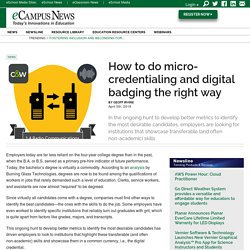
Today, the bachelor’s degree is virtually a commodity. According to an analysis by Burning Glass Technologies, degrees are now to be found among the qualifications of workers in jobs that rarely demanded such a level of education. Digital Badge Offerings – Digital Badges. 1.
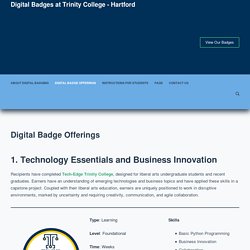
Technology Essentials and Business Innovation Recipients have completed Tech-Edge Trinity College, designed for liberal arts undergraduate students and recent graduates. GuideGamificationEducationDec2013. Digital Badges: An Annotated Research Bibliography v1. Digital Badges: An Annotated Research Bibliography selected and annotated by Sheryl Grant and Kristan E.
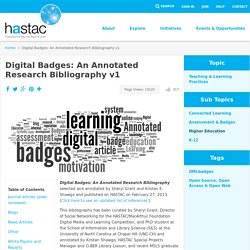
Shawgo and published on HASTAC on February 27, 2013. (Click here to see an updated list of references.) View of Getting Started With Open Badges and Open Microcredentials. Badges educausse. Stackable Credentialing: Redefining the Modern Community College. Stackable credentials are becoming a common pathway for students to reach more advanced academic outcomes and high-quality employment in lockstep.
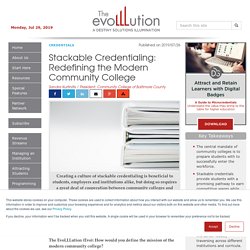
In this interview Sandra Kurtinitis reflects on the importance of stackable credentials in delivering in the mission of community colleges and discusses some of the challenges to creating a culture of stackability. The EvoLLLution (Evo): How would you define the mission of the modern community college? Sandra Kurtinitis (SK): In my mind the community college is the most important sector of higher education in the 21st century. This is because we provide both college and career training, so that our students can be prepared to either move right into the workplace or pursue a four-year bachelor’s degree.
Digital Badge Article Research Reviews - Digital Badges Interest Group - LibGuides at ACRL. Courses & Digital Credentials. Alternativecredentialsbriefmay2016. Badges, Certificates and Credentials. A certificate is an educational achievement representing completion of specialized training at the college level for the corporate professional.

Creighton University’s graduate certificates represent training at the master’s degree level, generally consisting of 12 to 18 semester units of coursework. An accredited bachelor’s degree in a related field is a standard prerequisite for entry into a graduate certificate program. In most cases, the graduate certificate through Creighton University can represent part of the coursework required for obtaining a master’s degree.
Business Professionals Health Care Professionals Educators The professional world uses credentials as evidence of completion of specific training or education programs. Understanding the differences in what credentials are being stacked and why (essay) Credential innovation is a hot topic in higher education, from microcredentials to digital badges, from competency-based and clickable transcripts to stackable credentials.
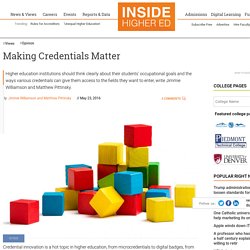
Members. BHEF members provide leadership and energy for BHEF’s work.
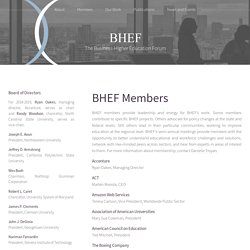
Some members contribute to specific BHEF projects. Others advocate for policy changes at the state and federal levels. Still others lead in their particular communities, working to improve education at the regional level. BHEF’s semi-annual meetings provide members with the opportunity to better understand educational and workforce challenges and solutions, network with like-minded peers across sectors, and hear from experts in areas of interest to them.
For more information about membership, contact Danielle Troyan. AccentureRyan Oakes, Managing Director ACTMarten Roorda, CEO Amazon Web ServicesTeresa Carlson, Vice President, Worldwide Public Sector Association of American UniversitiesMary Sue Coleman, President American Council on EducationTed Mitchell, President The Boeing CompanyLeanne Caret, Executive Vice President President and Chief Executive Officer, Defense, Space & Security. Developing Talent For The Digital Economy: The Business-Higher Education Forum Shows The Way. Washington University's partnership with Boeing is a recent example of the kind of business-university collaboration being championed by the Business-Higher Education Forum.
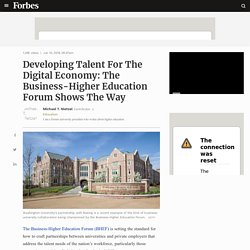
Getty The Business-Higher Education Forum (BHEF) is setting the standard for how to craft partnerships between universities and private employers that address the talent needs of the nation’s workforce, particularly those enterprises requiring digital and technological skills. Nearly 40 years old, the BHEF is a nonprofit membership organization comprised of Fortune 500 executives, major university presidents and other national educational leaders. In addition to its influential national policy voice, BHEF has focused on regional collaborations between its business and academic members that build durable degree programs, curricula and work-based learning in high-demand fields. And that is just what a recent BHEF project, with funding from the JP Morgan Chase Foundation, set out to do. Early results are already in. Willing Partners, Not Shotgun Marriages: Launching A Central Resource To Expand Non-Traditional Access Through Partnerships. The Role of Professional, Continuing, and Online Education Units in Shaping the Future of Higher Education.
We live in constantly changing times.

Higher education needs to change at the same pace, so it can meet the needs of learners and workforces of tomorrow. While reshaping a centuries’ old education model may seem daunting, it’s not an impossible challenge. In fact, some institutions are embracing education innovation. 5 Ways to Design Effective Rewards for Game-Based Learning. Learning by playing games can be a powerful way to teach.
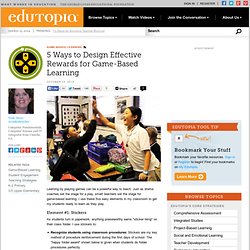
Just as drama coaches set the stage for a play, smart teachers set the stage for game-based learning. I use these five easy elements in my classroom to get my students ready to learn as they play. Element #1: Stickers As students turn in paperwork, anything praiseworthy earns "sticker bling" on their class folder. Digital Badges Finding Use in Education and Across Industries. The concept of digital badges, as an important means to motivate and reward achievement, is appearing in industries ranging from education all the way to retail. In the preceding blog on the topic, Will Digital Badges Replace Resumes… and Diplomas? , we discussed two distinct benefits: motivation and certification.